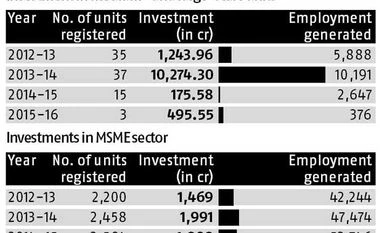The state had confirmations from more than 1,400 delegates for its two-day summit from March 7, sources said and pointed out this was overwhelming response in the aftermath of mass protests last month by Jats.
Haryana has 13 districts in the National Capital Region, which has given the state a leg up in industrialisation, yet investment flows in recent years remain gloomy.
A precipitous drop in new investments establishes Haryana's need for an image makeover.
Fresh investments in small and medium enterprises have stagnated and the number of new units registered has fallen. Traditional clusters at Ambala, Panipat, Karnal and Yamunanagar are in a shambles due to cheap imports.
Software exports from Haryana are growing at 7-8 per cent against the national average of 12-14 per cent. Haryana's software exports in 2014-15 were $6.2 billion, up from $5.8 billion in 2013-14.
The state unveiled a new industrial policy last year but in the absence of fiscal incentives it did not draw the attention of companies. A real estate boom in the last few years has run its course over limited land supply.
The state government has proposed amendments to the Haryana State Industrial and Infrastructure Development Corporation's guidelines for management of industrial estates, prescribing terms of allotment, and transfer and leasing of plots.
The amendments involve lowering the threshold for prestigious projects, ongoing acceptance of applications for allotments and a Tatkal allotment scheme at 25 per cent higher price with a provision for refund of value-added tax up to 50 per cent of the land cost.
Other amendments include easier rules for time extension, surrender of plots, leasing of premises, and increase in the floor area ratio in select areas.
Chief Minister Manohar Lal Khattar has waived electricity dues for the current and next billing cycles of all those whose houses or properties were damaged during the Jat reservation agitation from February 15 to 22.
The state government has decided in principle to offer VAT relief to traders and businessmen who suffered losses during the stir.
)